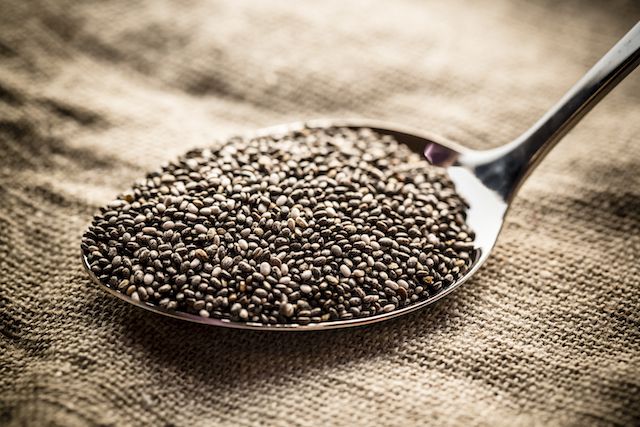:max_bytes(150000):strip_icc():format(jpeg)/ChiaOlivia-0d0afdc462134b22b83fa308d67c866b.jpg)
Chia seeds provide fiber, essential omega-3 fatty acids, proteins, minerals, and antioxidants — components that may help lower cholesterol, blood sugar, and blood pressure and promote other health benefits. They can be consumed as whole seeds or as a dietary supplement.
The tiny black and white chia seeds can be added to any food, and you don’t need to grind them to get the best results. You only need 1 tablespoon of the seeds to get about 20% of your daily fiber, which is the ingredient most likely responsible for chia’s ability to lower blood sugar and cholesterol.
In the United States, the Food and Drug Administration (FDA) does not regulate supplements the way it regulates prescription drugs. That means some supplement products may not contain what the label says. When choosing a supplement, look for third-party tested products and consult a healthcare provider, registered dietitian nutritionist (RD or RDN), or pharmacist.
Health Benefits
1. May Help Control Diabetes
In a research review, data from a small study suggested chia seeds lowered after-meal (postprandial) blood glucose (sugar) levels. But this effect might depend on the number of chia seeds you eat.
In another small study from the same review, chia seeds also reduced the weight and waist size of people with type 2 diabetes (high blood sugar). In this study, the chia seed group was asked to take 30 grams (g) of chia seeds per 1,000 kilocalories (kcal) every day for six months.
The review also mentioned another small study that supports using chia seeds along with standard treatments for people with well-controlled type 2 diabetes.
In this clinical trial, study participants took roughly 37 grams of chia seeds daily for 12 weeks. By the end of the study, participants experienced lower hemoglobin A1c (average blood sugar over the past few months) and blood pressure.
Participants also had lower C-reactive protein (CRP), a protein made by the liver that can indicate inflammation in the body.
Moreover, people who took chia sees had lower levels of von Willebrand factor (vWF) and fibrinogen, proteins involved in blood clotting.
These results suggest that chia seeds may help reduce risk factors for heart-related medical conditions in people with well-controlled diabetes. An example of a heart-related medical condition is a heart attack.
While these results are positive, more research with higher quality, larger, and longer-term studies is still necessary.
2. May Help Control High Blood Pressure
In a small study, taking 35 grams of chia seed powder daily for 12 weeks lowered blood pressure—regardless of whether the people took a blood pressure medication.
While promising, better research is needed to assess chia seeds’ effects better.
3. Might Improve MASLD
Metabolic dysfunction-associated steatotic liver disease (MASLD) was formerly known as nonalcoholic fatty liver disease or NAFLD. MASLD is a fatty liver condition that isn’t due to alcohol use.
In a small clinical trial, more than half of the study participants experienced an improvement in their metabolic dysfunction-associated steatotic liver disease.
In this study, participants included 25 grams of grounded chia seeds as part of their daily diet (one with moderate fats, proteins, and calories) for eight weeks. The participants’ daily diet consisted of 30% fat, 15% protein, and 55% carbohydrates (carbs).
Although these results are positive, further, extensive research with higher-quality and larger studies is still necessary.
May Help Reduce Cholesterol
According to the small MASLD clinical trial, 25 grams (g) of grounded chia seeds for eight weeks lowered the total cholesterol of people with MASLD. However, additional higher-quality research is needed to evaluate the effects of chia seeds on cholesterol.
Side Effects
1. Gastrointestinal Problems
In some cases, digestive system–related side effects might develop when increasing your fiber intake. If you currently don’t eat foods with fiber and you add chia seeds or any high-fiber foods to your meal plan, you may experience bloating, cramping, flatulence, or even bowel obstruction.
There is no tolerable upper limit set for fiber. However, experts generally advise adding fiber to your diet gradually to allow your body to adjust. If you consume excess amounts of fiber, your body may not be able to absorb certain minerals properly, especially calcium.
2. Allergic Reaction
There are reports of allergic reactions to chia seeds. If you’re having a severe allergic reaction to chia seeds, symptoms may include breathing difficulties, itchiness, and rash (specifically dermatitis).
If you’re having a severe allergic reaction or if any of your symptoms feel life-threatening, call 911 and get medical help right away.
3. Rare Side Effects
Since chia seeds might affect blood pressure, blood sugar, and blood-clotting proteins, other potentially serious complications may include excessively low blood pressure (hypotension) and blood sugar (hypoglycemia). Severe bruising or bleeding also are possible.
There is also a report of kidney problems when adding chia seeds to a high-oxalate diet (a diet with foods that bind to calcium in the large intestine, neutralizing their impact). High blood oxalate levels may also raise your risk of kidney stones.
Chia Seed Nutritional Information
Chia seeds are often referred to as a “superfood” because of their beneficial nutritional profile. Furthermore, a little bit goes a long way. A single serving of chia seeds is just 1 ounce (28 grams) or about 2 tablespoons.
According to USDA data, 1 ounce (28g) of chia seeds provides:
- Calories: 138
- Fat: 8.7 g
- Carbohydrate: 11.9 g
- Fiber: 9.7 g
- Protein: 4.7 g
Fat
The fat in chia seeds is primarily polyunsaturated fat (6.7 g) with smaller amounts of monounsaturated fat (0.7 g) and saturated fat (0.9 g). Unsaturated fats, like polyunsaturated fat and monounsaturated fat help to boost heart health by improving cholesterol levels when they are consumed instead of saturated fat.
Chia seeds also provide omega-3 fatty acids, a type of polyunsaturated fat. Specifically, the seeds provide alpha-linolenic acid (ALA), a type of fatty acid that is not made in the body, so it must be consumed in food. ALAs contribute to better heart health, boost brain function, and promote overall well-being.
Fiber
The fiber in chia seeds plays a few different roles in the body. Fiber helps to improve digestion by providing bulk to stool and making stools softer, thereby reducing the incidence of constipation.
Fiber also helps to lower LDL cholesterol, sometimes called “bad” cholesterol, and increases HDL cholesterol, often called “good” cholesterol.
Current dietary guidelines suggest that adults consume 28 grams of fiber per day. A single serving of chia seeds provides almost 10 grams or over a third of the recommended daily intake.
Protein
The protein in chia seeds provides energy, helps stabilize blood sugar and helps to build and maintain muscle. Since chia seeds contain all nine essential amino acids, they are considered a “complete” protein. Essential amino acids are those that are not made in the body, so they must be consumed in the diet.
Antioxidants
Chia seeds contain antioxidants, including chlorogenic acid, caffeic acid, myricetin, quercetin, and kaempferol. Antioxidants are believed to protect against oxidative damage in the body that happens as a result of exposure to free radicals.
Antioxidants like those found in chia seeds are believed to help protect against heart disease, cancer, and liver damage. They might also protect against some of the signs of aging.
Other Micronutrients
Other beneficial nutrients in chia seeds include:
- B vitamins including thiamine (vitamin B1), riboflavin (vitamin B2), and niacin (vitamin B3)
- Vitamin A
- Vitamin C
- Vitamin E
- Selenium
- Calcium
- Magnesium
- Potassium
- Phosphorus
Supplement Facts
- Active Ingredient(s): Omega-3 fatty acids, omega-6 fatty acids, proteins, caffeic acid, myricetin, quercetin, rosmarinic acid
- Alternate Names(s): Chia seed, Salvia hispanica, S. hispanica, Mexican chia, salba chia
- Legal Status: A food legal in all U.S. states
- Suggested Dose: May vary based on the specific dosage form, medical condition, and your nutrition needs.
- Safety Considerations: Possible side effects, medication interactions
Interactions
There is limited information about possible medication interactions with chia seeds. Possible interactions are based on the potential uses of chia seeds.
Use caution when taking chia seeds with the following:
- Blood pressure medications: Chia seeds may lower your blood pressure. This can cause additive effects (intensifying the effects of other drugs) with your blood pressure medications, such as Zestril (lisinopril), lowering your blood pressure too much.
- Blood thinners: Chia seeds may lower the levels of certain proteins involved in blood clotting. This may have additive effects with blood thinners, increasing your risk of bruising and bleeding side effects. Jantoven (warfarin) is an example blood thinner.
- Cholesterol medications: Chia seeds may lower your cholesterol. For this reason, chia seeds may have additive effects with your cholesterol medications, like statins.
- Diabetes medications: Chia seeds may lower your blood sugar. This may have additive effects with your diabetes medications—like insulin—and lower your blood sugar too much.
- Medications affected by fiber: Chia contains soluble fiber. This can affect the way some medications are absorbed. These medicines include some anti-seizure medications, bile acid sequestrants, diabetes medications, and tricyclic antidepressants.
It is essential to carefully read a supplement’s ingredients list and nutrition facts panel to know which ingredients and how much of each ingredient is included. Review this supplement label with your healthcare provider to discuss potential interactions with foods, other supplements, and medications.
Who Should Avoid Chia Seeds
A healthcare provider may advise against taking chia seeds if you have certain pre-existing conditions. It doesn’t mean that you can’t consume chia seeds, but you should get personalized advice based on your health profile.
You should talk to your provider about consuming chia seeds if you have:
- A known allergy to chia seeds
- A bleeding condition
- Diabetes
- High blood pressure
- Diagnosed kidney problems
How to Include Chia Seeds in Your Diet
You can easily include chia seeds into your diet by adding whole or ground seeds to your food.
For example, chia seeds can be sprinkled on:
- Yogurt
- Salads
- Cereal
- Pancakes
- Pudding
- Smoothies
- Hummus or other dips
You can also add ground chia seeds to soups or sauces to use as a thickener.
Some people mix chia seeds with water. To try this method, add about 1-2 tablespoons of the seeds to a full glass of water and allow the mixture to sit for about 10 minutes. When you drink it, the water will have a gel-like consistency.
How Much Chia Seed Should I Consume?
While there are some studies on chia seeds in humans, more studies with high-quality clinical trials are still necessary. For this reason, there are no guidelines on the appropriate dosage to take chia seeds for any condition.
In some clinical trials, however, the amount of chia seeds roughly ranged between 25 and 37 grams per day. The specific dose may vary based on the dosage form, medical condition, and the total number of calories you consume per day.
Follow a healthcare provider’s recommendations or read the label instructions if you take chia seeds.
Always speak with a healthcare provider before taking a supplement to ensure that the supplement and dosage are appropriate for your individual needs.
What Happens if I Take Too Much Chia Seed?
There is little information about the safety, toxicity, and overdose of chia seeds in humans. But chia seeds appear generally safe at typical amounts added to food.
Symptoms of overdose with chia seeds are likely similar to its potential common and serious side effects, just excessive and severe. For example, a diet high in chia seeds might raise your risk of kidney problems or kidney stones.
If you accidentally took too many chia seeds or suspect you are experiencing life-threatening side effects, seek immediate medical attention.
Where to Find Chia Seeds
You can buy chia seeds as a whole food or as a supplement. However, health nutrition guidelines typically place more importance on food sources to improve the diet.
Although food sources are preferable, there is still a place for supplements for people who have trouble absorbing nutrients. This may be the case in people in certain age groups or with certain medical conditions.
Food Sources of Chia Seeds
Chia seeds are available online, in most supermarkets, or at natural food stores. They are usually found in the same section where you’d find rice or other grains. Alternatively, you can find them in the bulk food sections of many markets.
Additionally, you might find whole or grounded chia seeds added to the following:
- Cereals
- Chocolate
- Dairy products
- Desserts and other sweets
- Edible ices
- Fruit products
- Nonalcoholic drinks
- Vegetable products
Chia Seed Supplements
Chia seeds might be available in the following forms:
- Caplets
- Capsules
- Liquid
- Powder
Vegetarian and vegan options might also be available. You may also see chia seeds in combination with other ingredients.
Your specific product will depend on your preference and what you hope to achieve. Each product may work a bit differently, depending on the form. Therefore, following a healthcare provider’s recommendations or label directions is essential.
How to Store Chia Seeds
The best way to store chia seeds is to put them in an air-tight container such as a mason jar. Mason jars can be found online or in many home stores or supermarkets.
Clear containers are helpful because they allow you to see the seeds to assess how much you have. But other types of containers also work, such as air-tight plastic containers or even sandwich bags or other types of sealable plastic storage bags.
Some people refrigerate chia seeds to help them last longer. Chia seeds can become rancid if they are too old. But if chia seeds are stored properly in an air-tight container, away from sunlight, they can last two to four years.
Keep in mind that if you plan to travel out of the country with chia seeds, you may be required to declare them at your destination. Chia seeds (like all seeds) are a plant product, and many countries (like the U.S.) require that you declare this type of agricultural product upon arrival.
Summary
Chia seeds are edible seeds from the flowering chia plant. They provide fiber, protein, and antioxidants that can benefit health in a variety of ways. Studies have suggested that they might have potential uses in people with type 2 diabetes and high blood pressure.
But with almost all high-fiber foods, you may want to introduce them to your diet gradually to avoid gastrointestinal discomfort. Add chia seeds to smoothies, pudding, yogurt or salads to enjoy the taste, the crunch, and the health benefits of this powerful seed.








